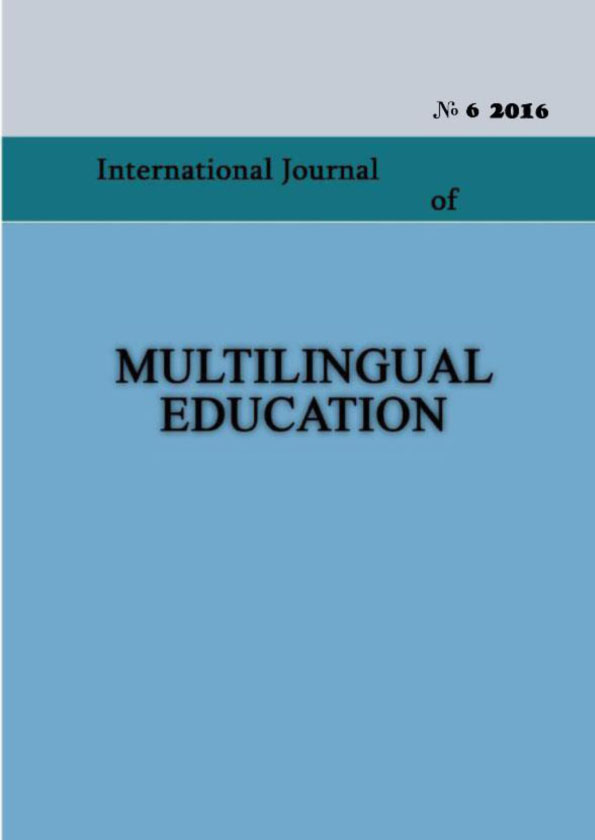Developing Intercultural Competence in Students - Philologists through Literature
Keywords:
intercultural literacy, intercultural competence target culture, intercultural skills.Abstract
The focus of attention in this article is exploration of cultural messages conveyed by literary texts which are used as instruments for raising cultural awareness of students-philologists. The goal of this work is to demonstrate the actual intercultural potential of fictional discourse for understanding otherness and developing students' linguosociocultural competence. The re- search is based on the experience of analyzing English literary texts with English philology students but the techniques used are applicable for studying culture in any foreign language.
References
Anashkina, E.V. (2012) Teaching Cultural Diversity through Fictional Discourse. In Inernational Journal of Humanities and Social Sciences vol.2 (21), 35-39.
Byram, M. (1997) Teaching and Assessing Intercultural Communicative Competence. Clevedon: Multilingual Matters.
Byram, M. and Zarate, G. (1997) Defining and Assessing Intercultural Competence: Some Princi- ples and Proposals for the European Context. Language Teaching 29, 14-18.
Byram, M. and Fleming, M. (eds) (1998) Language Learning in Intercultural Perspective: Ap- proaches through Drama and Ethnography. Cambridge: Cambridge University Press.
Burwitz-Melzer, E. Teaching Intercultural Competence through Literature. In M. Byram, A. Nich- ols and D. Steven (eds) (2000) Developing Intercultural Competence in Practice (29-43). Clevedon: Multilingual Matters.
Corbett, J. (1997) Language, Genre and Culture. In LABSA Journal 1(2), 21-28.
Corbett, J. (2000) Culture, Variety and ELT. In K. Seago and N. MacBride (eds) Target Language
– Target Culture? (156-176). London:AFLS / CILT.
Corbett, J. (2003) Intercultural Approach to English Language Teaching. Clevedon: Multilingual Matters.
Keane, Molly (1981) Good Behaviour. London: Hazell Watson and Vincy Ltd.
Kramsch, C. (1993) Context and Culture in Language Teaching. Oxford: Oxford University Press. Kramsch, C. (1998) Language and Culture. Oxford: Oxford University Press.
Loveday, L. (1981) The Sociolinguistics of Learning and Using a Non-Native Language. Oxford: Pergamon.
MacDonald, M. (2000) Strangers in a Strange Land: Fiction, Culture, Language. In K. Seago and N. McBride (eds) Target Language – Target Culture? (137-155). London: AFLS / CILT.
Munro H.H. When William Came // The Penguin Complete Saki. London: Penguin Books,1982. Munro H.H. Reginald on Worries // The Penguin Complete Saki. London: Penguin Books, 1982. Pulverness, A. (1996) Worlds within Words: Literature and British Cultural Studies. In David A.
Hill (ed) Papers on Teaching Literature from the British Council's Conferences in Bologna 1994 and Milan 1995. The British Counci, Italy.
Stern, H.H. (1992) Issues and Options in Language Teacting, ed. By P. Allen and B. Harley. Ox- ford: Oxford University Press.
Thompson, F.L.M. English Landed Society in the 19th Century. London, 1963, p.15.
Published
How to Cite
Issue
Section
License
Copyright (c) 2015 Liliia Teterina

This work is licensed under a Creative Commons Attribution-NonCommercial 4.0 International License.
Copyright (c) - Authors who publish with this journal agree to the following terms: Authors retain copyright and grant the journal the right of first publication with the work simultaneously licensed under a Creative Commons Attribution-Noncommercial 4.0 International License, which allows others to share the work with an acknowledgement of the work's authorship and initial publication in this journal. Authors are permitted and encouraged to post their work online (e.g., in institutional repositories or on their personal website) prior to and during the submission process, as it can lead to productive exchanges, as well as earlier and greater citation of published work (see The Effect of Open Access). Authors may enter into separate, additional contractual arrangements for the non-exclusive distribution of the journal's published version of the work (e.g., post it to a repository or publish it in a book), with an acknowledgement of its initial publication in this journal.

